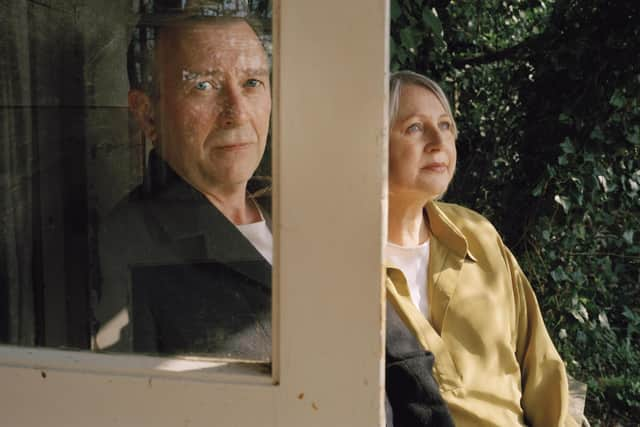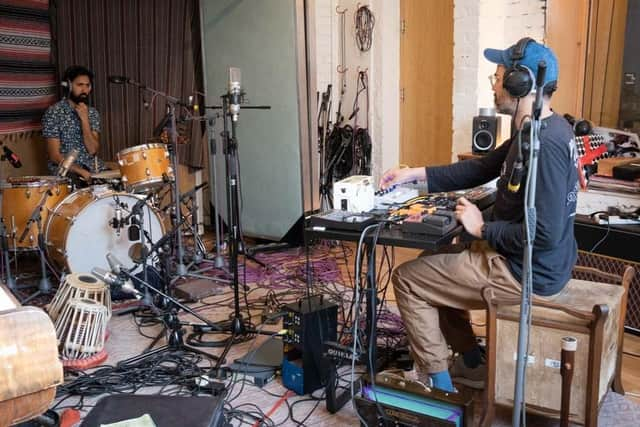Album reviews: Rusty | Sun's Signature | Auntie Flo & Sarathy Korwar | racecar


Rusty: The Resurrection of Rust (EMI) ***
Sun’s Signature: Sun’s Signature (Partisan Records) ****
Auntie Flo & Sarathy Korwar: Shruti Dances (Make Music) ***
Racecar: Orange Car (self-released) ****
As if new material and Spanish language re-recordings of his classic albums are not enough activity for a musician in his late sixties, Elvis Costello celebrates the 50th anniversary of his first band Rusty in relaxed EP style, reteaming with his original bandmate Allan Mayes to make “the record we would have cut when we were 18, if anyone had let us." Back then, the not-yet-Costello was still billed as DP McManus and recalls that “I looked like a sack of spuds that had been left out in the rain”.
Advertisement
Hide AdAdvertisement
Hide AdRusty were briefly mainstays of the Liverpool folk clubs, playing mostly covers and making their first forays into songwriting. The Resurrection of Rust features new recordings of six songs from their live sets of the time, executed with a carefree, celebratory feel – not unlike the latest Van Morrison album, minus the lockdown moaning.
The Costello career associations with the redoubtable Nick Lowe date right back to this era with two songs by Lowe’s own first band, Brinsley Schwartz – the rhythm’n’blues sashay Surrender to the Rhythm and the yearning Don’t Lose Your Grip on Love – while there is double Neil Young action with a mash-up of Everybody Knows This is Nowhere and Dance Dance Dance.


Mayes’ weathered voice pairs well with Costello’s more distinctive tone. He provides the grizzled, conversational lead vocal on Maureen and Sam, a song that would eventually become Costello composition Ghost Train, while the softer Everly Brothers-indebted country pop of Warm House (And an Hour of Joy) is a beguiling example of early Elvis fare.
Former Cocteau Twins frontwoman Elizabeth Fraser releases her first new music in thirteen years as Sun’s Signature, a long-percolating collaboration with her partner Damon Reece (Spiritualized/Massive Attack) with roots in their performance at the Anohni-curated Meltdown Festival ten years ago.
Like Kate Bush, there is much mythology and speculation round Fraser but, essentially, she and Reece are sonic perfectionists who like to take their time, and their eponymous debut EP is worth the wait, with Fraser making use of a higher soprano register and actual words in English rather than the fluttering vocalese of the Cocteaus.
She is accompanied by some of the lesser-known twinkling acoustic timbres of the orchestra – celeste, cimbalom, dulcimer – as well as the nimble precision of former Genesis guitarist Steve Hackett to create a languorous baroque pop soundtrack, not unlike Goldfrapp’s earliest pop exotica. Golden Air pairs electro folk airiness with wiggy distortion and Underwater charts a path into darker waters, while Fraser is at her most demure backed by lithe woodwind on Bluedusk. A timeless treat which fans may have to dine out on for a while.


In another intoxicating pairing, Scottish Album of the Year Award-winning producer Brian D’Souza aka Auntie Flo teams up with tabla player Sarathy Korwar to explore their Scottish-Goan and London-Indian crossover traditions. Shruti Dances is a mini-album comprising six monosyllabic, onomatopoeiac titles which embellish Indian classical percussion with drones from a shruti box and D’Souza’s immersive electronica production skills, spanning the irresistible polyrhythmic bounce of Pa to the trancey odyssey of Ni.
Advertisement
Hide AdAdvertisement
Hide AdThe East Lothian trio of Izzy Flower, Robin Brill and Calum Mason came together from other bands bringing their folk, pop and prog influences to bear on boxfresh new outfit racecar, whose accomplished, natural debut album Orange Car moves seamlessly from the spry Afrobeat rhythms of Animals through the proggy time signatures and electro jazz keyboards of Under You to the hypnotic canon vocals of Flood before taking a turn into the hands-in-the-air rave territory of Salt, the quirky indie of Stranger Shores and the chunky rock stylings of Appetite.
CLASSICAL
A Meditation: St John Henry Newman (CORO) ****
There’s a glut of good choral recordings hitting the market just now, and A Meditation is no exception. It’s another enterprising album by The Sixteen and its director Harry Christophers in partnership with the Genesis Foundation, who together have generated five new choral works by James MacMillan, Will Todd, Anna Semple, Eoghan Desmond and Lisa Robertson. The three youngest were selected and mentored by MacMillan, and the root inspiration is a meditation by St John Henry Newman, poetically adapted by Robert Willis, Dean of Canterbury. The range of treatments by these composers is fascinating and varied, from Todd’s mesmerising “I shall be an angel of peace” (illuminated by the soulful solo violin of Sarah Sexton) and Scots-born Robertson’s translucent “…a link in a chain…”, to Desmond’s ruminative “Nothing in vain” and MacMillan’s own sumptuous version of the latter. There’s music, too, by Elgar, Boyce, and Bob Chilcott. Ken Walton
FOLK
Hannah Rarity: To Have You Near (Own Label) *****
Hannah Rarity’s second album responds eloquently to difficult times, laced through with longing, regret but also hope. Its mainly contemporary material is considerately accompanied by the likes of guitarist-producer Innes White, pianist John Lowrie and drummer Scott Mackay, while Boo Hewerdine contributes discreet backing vocals as well as one of his own compositions. Rarity’s own song, My Friend, reflects poignantly on “one hell of a year”, while she does full justice to Gerry O’Beirne’s gorgeous west-of-Ireland ramble Shades of Gloria, escorted by a string section led by Seonaid Aitken. She dwells lovingly on Hewardine’s I’m Not Going Anywhere and lifts Take It With Me out of the growly warmth of Tom Waits’s original, rendering it with impeccably lingering clarity. Memorable standouts are her peerless cover of the old Stephen Foster chestnut, Hard Times, and her closer, the wistful entreaty of Julie Matthews’ Comes the Hour. Jim Gilchrist